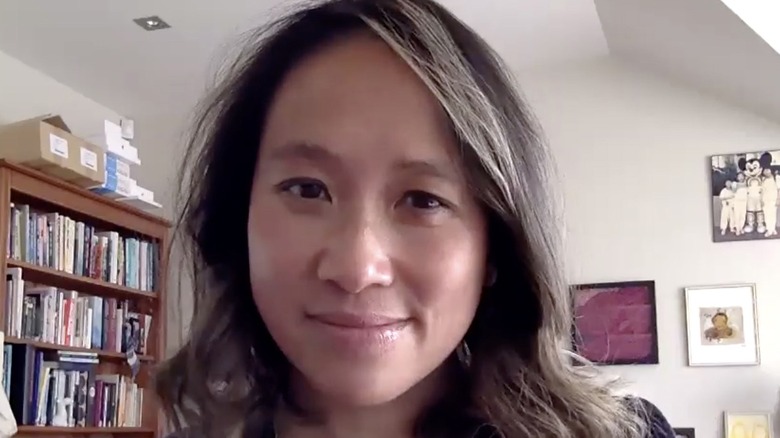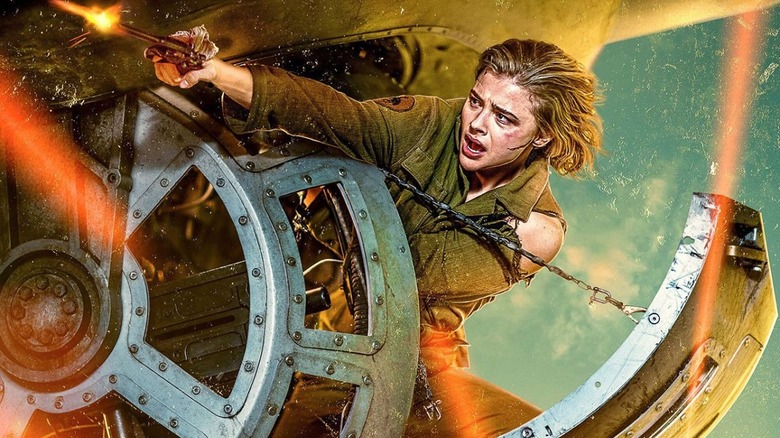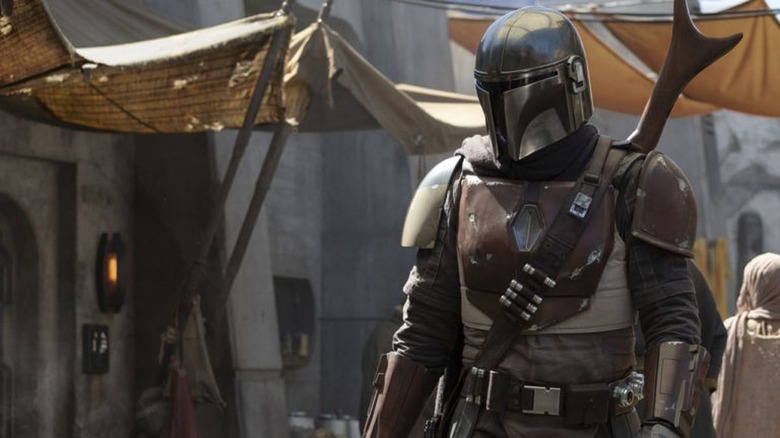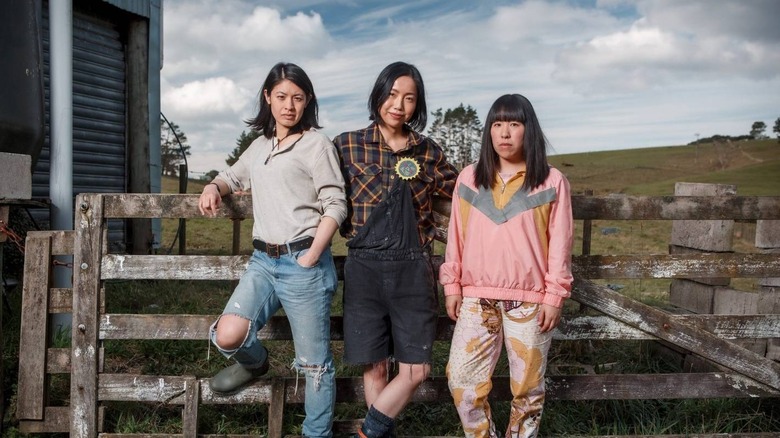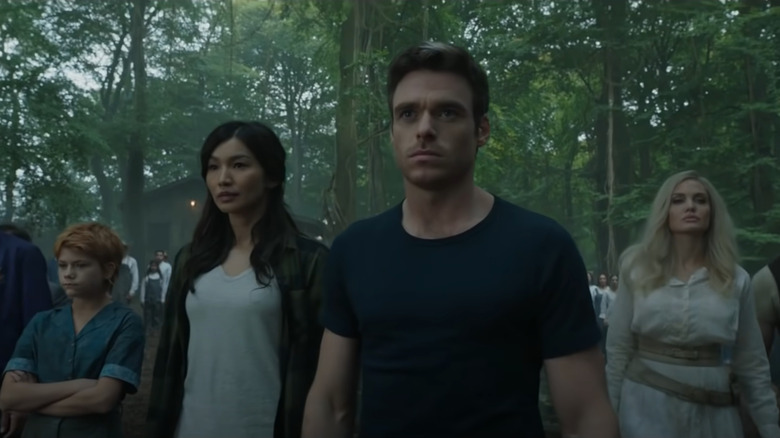Shadow In The Cloud Director Roseanne Liang Reveals What It Was Really Like Making Her Claustrophobic Action Movie - Exclusive Interview
If you've spent, oh, let's say the last year or so feeling claustrophobically cooped up in a tight location with no simple means of escape, the Chloë Grace Moretz-led sci-fi movie "Shadow in the Cloud" is probably going to be relatable for you. Moretz plays Maude Garrett, a soldier with a top-secret mission who boards a plane full of men who are unhappy to see a woman in their ranks. The story sees Garrett locked inside a gun turret as an unlikely fate befalls her, her cargo, and the plane she's aboard — specifically, being attacked by a nasty gremlin.
We sat down with "Shadow in the Cloud" director Roseanne Liang to talk about the 70-page script she inherited and how she rewrote it. We also talked about Moretz's claustrophobia and how the pair worked together to take that literal anxiety and build a tight, low-budget horror movie that is equal parts scary and triumphant. Naturally, we also talked about "Star Wars," the MCU, and Liang's vision for the post-apocalypse.
How to direct a claustrophobic actor in a tight spot
So much of this movie is just Chloë Grace Moretz in a gun turret and I wanted to start with the relationship that you built with her working on "Shadow in the Cloud," just because so much of it is the two of you.
The first time we met, we hit it off over the script. It really resonated with us from, I guess, a lived-in experience and how it related to the way we've come to experience the world. And then yeah, we worked together. We found each other's rhythm. She was actually claustrophobic, so being in that tiny ball turret was a challenge to her. But we found our way through, and we developed a relationship that was very robust. She'd say what she'd want and I'd say what I want and we'd find a way to do it. It was one of those really great relationships that grew as we kept working with each other.
Elaborate on learning through doing with this film, just because there are parts of it that feel like a one-act play. It really is built that way. That is a particular kind of filmmaking, and I would be curious to know what you learned on that shoot.
I learned that cabin fever is no joke. I learned that this was a really special situation because we actually ran it a little bit like a play. We wanted to make it as real as possible, as real to the script as possible, given that we were in a disused office space in New Zealand on the ground. And we were trying to build this idea of flying all the time.
The situation was that there were seven guys in a shipping container out in the parking lot who were getting on famously, and that they'd form a camaraderie that made her feel on the outs inside this metal and glass ball that she was sitting in, that she was actually claustrophobic and had a physiological reaction to while she was trying to do all the things as her character that she was trying to do. I guess I learned how to direct in a completely different way, because we were restrained by the resources and the limitations that our project had. Because we were relatively low-budget, we had to do certain things in a certain time with a certain budget level. And I think it's that classic thing — limitations are the mother of inspiration — in that I actually ended up texting directions to Chloë.
This was something that I'd never done before. And I didn't know whether it would work or not, but because it took so long for her to get out of the... even though there was always a side off for her claustrophobia, technically she could jump out. It was about three meters off the ground. So if she jumped out, she would have hurt herself. So she'd crunch herself into this ball in this crunched-up fetal position with her legs by her ears, and then wouldn't get out for as long as her bladder would last. And I would text her things and we'd communicate that way. I did have a mic where I could speak to only her and I could whisper something to the men in the shipping container out in the parking lot to say something or do something to keep Chloë on her toes on set. And likewise, I could say something to Chloë, if we wanted to get a rise out of the guys in the parking lot. So we learned a lot, but it's very specific to what we were trying to achieve.
The messiness of Star Wars
You had a 70-page script for "Shadow in the Cloud" that was given to you originally. What was in the skeletal structure that remains? And what was it that you added to it that is the stuff that really sticks out to you?
I feel like skeletal structure is a really good way to put it. There weren't bones, muscles — it wasn't that there weren't any, it's just that they were sketched out a little. So the bones remained the same in the original script that I received. It had the conceit of staying in one place and never cutting to anyone else. That was something that I always wanted to keep. Admittedly the producers and myself were worried about that in terms of ... we didn't want it to become one of those movies that was enamored of its own conceit. We wanted it to be genuinely engaging. And then the structure of everything that happened after that, it was about the same. But for instance, the men who are a wolf pack were homogenous. They melded into one. So we did a lot of work on making them more distinct from each other, giving them an extra voice. And whether or not that comes across, because we don't spend a lot of time with them in terms of seeing them, we hear them a lot. But if you dig deeper, you can see that each man has a place in the wolf pack. You've got the sexual guy, you've got the calm leader, you've got the naysayer, and you've got the kid that just wants to be loved by his friends.
I know you're a "Star Wars" fan, and then I looked and I remembered that "The Mandalorian" and "Obi-Wan Kenobi" both have Deborah Chow as a director. And I thought, "Well, that's cool." How do you feel about that? And also if you were going to direct a "Star Wars" story, is there a character or a part of the universe you'd want to play with?
Oh my God, I haven't actually thought about this. No one's asked me this question before. The original trilogy is everything to me. I'm that person, I'm of that generation. If we're going to talk about logistics of "The Mandalorian" and how it was made on this incredible LED volume with Unreal Engine technology, I mean, this is what I mean by the limitations being the mother of inspiration. The fact that Jon Favreau helped develop this technology to his will, to what he was doing on "The Mandalorian," was incredible. And we've joked that we made "Shadow in the Cloud" one year too early, because we would have had access possibly to an LED volume, which would have made a lot of our green and blue screen expenses a lot less — with the right R&D, of course. I think what "The Mandalorian" does so well is that it captures the original messiness of the original trilogy because it feels, even though it's an epic slick world, it feels personal to me. And that sleight of hand that was done has been somehow done again with "The Mandalorian" series. And maybe that's a tonal thing. I want to work in that tone. I want to work with that original feeling.
A different kind of post-apocalypse story
I really want to talk to you about your current series, "Creamerie." I would really be curious to talk with you about it — what the show is about, and why you're so interested in this story and telling it now.
We came up with this idea before the pandemic in 2018 when we were watching "A Handmaid's Tale." And I love "A Handmaid's Tale," but it makes me very, very sad and heavy. And we're talking about how sad and heavy "Handmaid's Tale" season two's ending was affecting us. And we were like, we want to deal with the apocalypse in a way that isn't just so ... I don't know how to give words to that feeling. But it was mid-Trump term as well. And we're like, "We hate people, but we want to believe in them." So we came up with this tone.
But what I wanted to say about the world was that we are not going to win through polarization. It goes back to the Asian concept of yin and yang about balance. For every force, there's an equal and opposing force. And in fact, the best work together when there's a bit of both in each. The value of centrism, and I don't mean centrism as a privilege. Like, "Oh, it's not my problem so I don't have to deal with it." I mean centrism as in finding nuance in what the other side is saying. Because there is just no way we're going to get through the apocalyptic things that we're dealing with right now if we don't bridge that gap, if we don't try and understand each other. "Creamerie" is a way of saying it in a really funny, slightly naughty way.
Marvel vs. DC
I saw a tweet of yours where you were very excited to see "Nomadland" win best director for Chloe Zhao. That's a pretty big deal, again, and she's done Marvel's "The Eternals," too. Is there anything you'd like to do for the Marvel Cinematic Universe?
I think it's incredible what Marvel have done with idiosyncratic directors like Taika Waititi and Chloe Zhao and trusting in their tonal nuances and particularities. I would love the chance to do a Marvel movie. I have to confess, I know this is sacrilege, but I'm more of a DC fan. I'm a Batman girl. I'm not even a DC person. I'm a Batman person. That's my childhood adolescent influence — Frank Miller's "Batman: Arkham Asylum" was my first entrée into the comics world. And then I started reading a whole lot of Alan Moore. But then if I could make a Marvel movie that speaks to some deep and urgent societal ill, then obviously I'd jump at that chance. It's I think human as a genre is where I'm at. I want to and I need to believe that there is some value in humanity because everything that we're experiencing right now is contrary to that fact. But human as a genre is ideally what I want to do. And whether it's through Marvel or any other giant studio, I'm there so long as they trust me the way that they trust Chloe and Taika.
"Shadow in the Cloud" is available on Hulu now.
